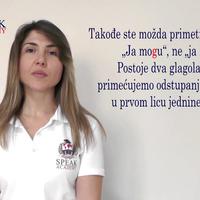Serbian Lesson 5.3 - Voice changes in the forms of the present -Serbian language courses
||глагол|изменения|||формах||||||
||voice|voice changes|||forms|||present tense|||
||Голос|зміни|в||формах||||||
Serbisch-Lektion 5.3 – Stimmveränderungen in den Präsensformen – Serbisch-Sprachkurse
Serbian Lesson 5.3 - Voice changes in the forms of the present - Serbian language courses
Lección de serbio 5.3 - Cambios de voz en las formas del presente - Cursos de idioma serbio
Сербский урок 5.3 - Изменение голоса в формах настоящего времени - Курсы сербского языка
Sırpça Dersi 5.3 - Mevcut formlardaki ses değişiklikleri - Sırpça dil kursları
塞爾維亞語課程 5.3 - 現在式形式的語音變化 - 塞爾維亞語課程
Glasovne promene
|изменения
Changements phonétiques|changements phonétiques
Voice|changes
Voice changes
Kada smo govorili o glasovima
||||voix
||we were speaking|one|voices
||||голосах
When we talked about voices
u srpskom jeziku već smo napomenuli da se dešava
|||||упомянули|||происходит
|||déjà|avons déjà mentionné|mentionné|||se passe
|||||mentioned|||
|||вже||зазначили|||відбувається
in der serbischen Sprache haben wir bereits erwähnt, dass es passiert
in the Serbian language, we have already noted that it happens
da se neki glasovi u određenim oblicima
|||||определённым|
||certains|des voix||certains|formes spécifiques
|||voices||certain|forms
|||||визначених|
zu einigen Stimmen in bestimmten Formen
that some sounds change in certain forms
reči menjaju zbog lakšeg izgovora
|||легкого|произношения
|changent||plus facile|
|change||easier|pronunciation
|||легшого|вимови
words change for easier pronunciation
To se dešava i u oblicima prezenta
||se produit|||formes|
|||||forms|present
This also happens in the forms of the present tense
Ne mogu da pišem. Neki ljudi na ulici sve vreme viču
||||||||||кричат
|||||||||tout le temps|crient
|can’t||I am writing||||||all the time|are shouting
|||||люди|||||кричать
I can't write. Some people on the street are shouting all the time.
Glasovne promene koje se dešavaju su sledeće:
||||происходят||
||||se produisent||
Vocal||||are happening||
||||відбуваються||
The voice changes that are happening are as follows:
Glas K prelazi u Č
Voix||se transforme en||
voice||changes||C
||перетворюється||
The sound K turns into Č
Glas G prelazi u Ž
|letter G|||G sound changes to Ž
Oni Lažu, ne lagaju
|лгут||
|Ils mentent||mentir
|lie||they lie
|брехуни||не брешуть
They Lie, they do not lie
Glas H prelazi u Š
|H|||sh sound
|глас H|||
Sound H turns into Š
Glas S prelazi u Š
||passes||
Sound S turns into Š
Glas Z prelazi u Ž
||переходит||
|Sound Z|||Ž
|З|||
Glas T prelazi u Ć
|T|||soft ch
Takođe ste možda primetili da sam rekla:
|||remarqué|||
|||noticed|||
You may have also noticed that I said:
Ja mogu , ne ja možem
||||I can
||||можу
I can, no I can't
Postoje dva glagola u kojima primećujemo odstupanje od građenja u prvom licu jednine prezenta
|||||замечаем|отклонение||строения|||||
Il y a||verbes||lesquels|nous remarquons|écart|||||||
||verbs|||we notice|deviation||building||first|person|singular|
|||||помічаємо|відхилення||будування|||||
There are two verbs in which we notice a deviation from the construction in the first person singular present
To su glagoli hteti i moći
|||vouloir||pouvoir
Njih je lako zapamtiti
|||запомнить
Eux|||Les retenir facilement.
||easy|to remember
їх|||
They are easy to remember
Ja što hoću to i mogu
||I want|||
||хочу|||
ich kann machen, was ich will
What I want, I can do
HOĆU
I WANT
MOGU
Prezent se vrlo često upotrebljava u srpskom jeziku
|||souvent|utilisé|||
the present||||used|||
||дуже|дуже часто||||
Das Präsens wird sehr oft in der serbischen Sprache verwendet
The present tense is very often used in the Serbian language
U nekim slučajevima može da se zameni prošlo i buduće vreme:
||||||заменить||||
||cas
|peut|||remplacer|passé||futur|
||cases||||replace|||future|
||||||замінюється|минуле||майбутнє|
In einigen Fällen können Vergangenheits- und Zukunftsformen ersetzt werden:
In some cases, it can replace the past and future tenses:
Sutra idemo u bioskop
завтра|||кінотеатр
Tomorrow we are going to the cinema
Sutra ćemo ići u bioskop (futur)
|||||future tense
|||||майбутнє час
Tomorrow we will go to the cinema (future)
JUče pođem u grad
|je suis allé||
|I went||
вчора|я пішов||
Yesterday I went to town
kad počne da pada kiša - nepravilno
|начнёт||||неправильно
|commence||||incorrectement
|||||irregular
коли|почне|||дощ|неправильно
when it started to rain - irregularly
Kad sam juče pošla u grad, počela je da pada kiša
||hier|suis partie|||a commencé||||
|||I went|||||||
||вчора|коли я йшла||місто|почала||||дощ
When I went to town yesterday, it started to rain

